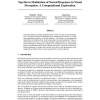Free Online Productivity Tools
i2Speak
i2Symbol
i2OCR
iTex2Img
iWeb2Print
iWeb2Shot
i2Type
iPdf2Split
iPdf2Merge
i2Bopomofo
i2Arabic
i2Style
i2Image
i2PDF
iLatex2Rtf
Sci2ools
129
Voted
NC
2008
2008
Top-Down modulation of neural responses in visual perception: a computational exploration
Visual perception is typically performed in the context of a task or goal. Nonetheless, visual processing has traditionally been conceptualized in terms of a fixed, task-independent hierarchy of feature detectors. We explore the computational implications of allowing early visual processing to be task modulated. Using artifical neural networks, we show that significant improvements in task accuracy can be obtained by allowing the weights to be modulated by task. The primary benefits are obtained under resource-limited processing. A relatively modest taskbased modulation of weights and activities can lead to a large performance boost, suggesting an efficient means of increasing effective cortical capacity.
| Added | 14 Dec 2010 |
| Updated | 14 Dec 2010 |
| Type | Journal |
| Year | 2008 |
| Where | NC |
| Authors | Michael C. Mozer, Adrian Fan |
Comments (0)

